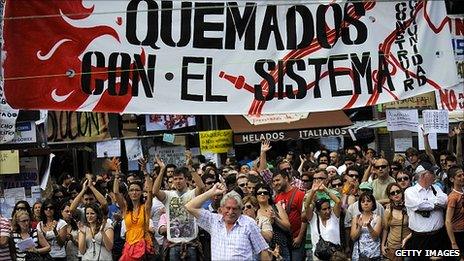Spain: Anti-Zapatero vote tests market nerves
- Published
- comments

"Burnt by the system": Crowds have been venting their anger in central Madrid
For a period European officials feared Spain. They worried that if Portugal needed a bail-out, Spain would be next. And if Spain needed rescuing no one could be quite certain where the funds would come from.
And then the government in Spain got smart. It got serious about reducing its deficit, about labour reforms, about stress-testing its banks. Bond traders gradually classed it differently to Portugal and it was removed from the eurozone casualty department.
But nerves are back. In weekend elections the governing Socialist party took a thrashing. Even in strongholds like Seville and Castilla-La Mancha it was defeated. There is a pattern emerging in Europe. Given a chance, the people turn on the incumbents.
In Spain national elections do not have to be held until next March, but Prime Minister Zapatero is a lame duck. If further reforms are needed he lacks the authority to implement them.
What has really unsettled observers, however, is what the new conservative administrations will find when they start peering into the accounts in the town halls and regional governments across the country. There are stories of undisclosed debts, of payments not made. This is precisely what happened after elections in Catalonia. The deficit was found to have been much greater than acknowledged.
If that were to happen on a significant scale it would be easy to imagine a crisis. The markets are very sensitive to hidden debts. There could be tension between central and local government.
Zapatero has said there will be no more austerity measures, but he is committed to reducing the deficit to 6% of GDP next year. And even if further tightening were needed he might be unable to implement the measures.
The Spanish people have finally found their voice. For over a week they have been occupying squares across the country to protest at unemployment. For 16- to 24-year-olds, 43% are without work. In Madrid they have turned Puerta del Sol into a tent city.
What unites the protesters is a desire for a change, a sense that the "establishment has failed an entire generation". Having taken to the streets they might not accept further austerity if it was needed.
So Spain is once again troubling markets and officials. A weak government is caught between needing to enforce spending cuts and protesters demanding work.